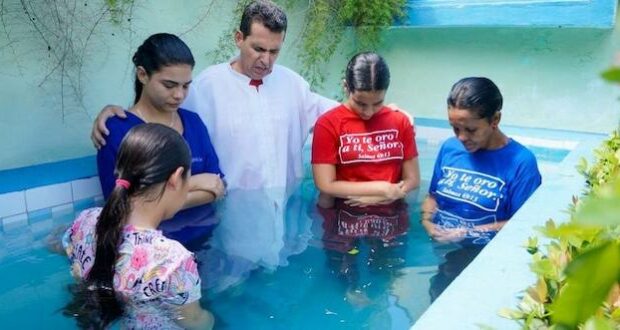MATANZAS, Cuba — Church members in this port city overlooking the Bay of Matanzas sang “Glory, Glory Hallelujah” on a recent Sunday as they celebrated the baptisms of five new Christians.
Afterward, about 250 spiritual brothers and sisters ate fellowship meals piled high with beans grown at a church-owned farm.
The Versalles Church of Christ, about 60 miles east of Havana, hosted the joyous areawide gathering at a time of extreme economic crisis for this Caribbean island nation.
In such a stressful time, minister Tony Fernandez, 50, said he focuses on sharing the bread of life with fellow Cubans who often do not have enough bread.

A classic car crosses a bridge in Matanzas. Decades-old vehicles are a common sight on Cuban roads because of a longstanding U.S. trade embargo. (Photo by Bobby Ross Jr.)
“There have been very tough times, but God has always provided a solution and allowed us to continue moving forward,” said Fernandez, whose growing congregation meets in a government-authorized, open-air auditorium behind a former residence.
Born to serve
After Fidel Castro rose to power in the 1959 Cuban Revolution, the relationship between the government and the churches became quite tense in this socialist state 90 miles from Florida.
For decades, restrictions were placed on Christian churches, leading many religious leaders to leave the island. Worship services could only be held in officially registered buildings.
Before 1959, there were over 100 Churches of Christ on the island, but only six of them met in authorized places of worship. After the revolution, most of the congregations, plus congregations of other denominations, were forced to stop meeting.
But the societal upheaval did not stop Fernandez’s parents, Jose Antonio and Hilda, from teaching their son — their only child — to love Jesus.
“The three of us would meet very discreetly in our house because worshiping God was forbidden at that time,” recalled Fernandez, speaking through a Spanish-language interpreter.
Eighteen years of prayers preceded the boy’s 1973 birth.
“It was very much a Samuel situation,” said Tim Archer, Fernandez’s co-worker with Herald of Truth, an evangelistic outreach ministry based in Abilene, Texas.
In the Old Testament, a woman named Hannah asked God to bless her with a son. She promised to give him “to the Lord for all the days of his life,” as 1 Samuel 1:11 recounts.
Likewise, Archer said, “When Tony was born, his parents dedicated him to the Lord. And he feels that calling.”
Gospel spreads quickly
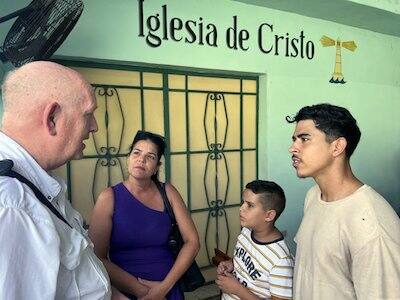
Herald of Truth’s Tim Archer visits with a family at the Versalles Church of Christ in Matanzas, Cuba. (Photo by Bobby Ross Jr.)
Most Sundays, Fernandez preaches at the Versalles church and then drives to a half-dozen mission points throughout the province of Matanzas — an area slightly smaller than Connecticut.
For the minister, a typical Lord’s Day starts at 8 a.m. and ends about midnight as he travels roughly 350 miles round-trip to share God’s word.
In all, he has helped plant 52 congregations in the province. Most are small groups meeting in homes. He drops off other men to preach at different locations along his route.
“I believe that Cuba is a country that has great potential for the Gospel,” he said. “There’s a lot of spiritual need, and when people receive the Gospel, it’s with great respect, and it spreads very quickly.”
During the week, he shuttles church members to medical appointments and checks on crops — such as beans, corn, peanuts and sweet potatoes — at the 114-acre farm the church operates south of the provincial capital.
The 15-year-old farm started small and grew after Fernandez baptized a rural couple who had lost two adult sons — one in a bicycle accident and another who died by suicide.
Their third son, Jorge Sanchez, was “living a wild life of drinking and chasing women,” the minister recalled.
Sanchez, now a devoted Christian, manages the farm.
“No turning back, no turning back,” he sang gleefully in Spanish on a recent Saturday as he trekked through a field.
With money short, the farm pays helpers with produce.
“One worker calculated the value of the food and told me, ‘You’re overpaying me,’” Sanchez said with a chuckle. “I told him, ‘We don’t calculate in money. We calculate in love.’”
Producing crops to feed church members as well as orphans and elderly people in the community has become more difficult with the recent theft of oxen.
“The only thing I ask,” a frustrated Sanchez said, “is that you be praying for us.”
Outpourings of love
Fernandez drives a 2005 Hyundai H-1 van. The motor is shot, but the minister can’t find a new one.
A longstanding U.S. trade embargo limits the availability of newer vehicles and car parts on the island. As a result, decades-old Buicks, Chevys, Fords and Pontiacs — kept running as long as possible — transform the island’s highways into a classic car show.
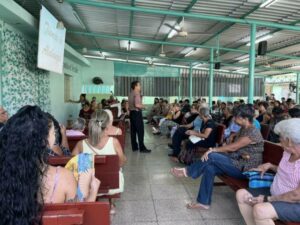
Tony Fernandez speaks as the Versalles Church of Christ in Matanzas, Cuba, gathers for an areawide worship assembly. (Photo by Bobby Ross Jr.)
Cuba blames the U.S. sanctions for its economic problems, while the U.S. cites its aim to restore democracy and respect for human rights. The COVID-19 pandemic only exacerbated the troubles for the island of 11 million people.
Fernandez rolls down his Korean-made van’s windows rather than run the air-conditioner because the impaired motor can’t handle the strain.
Despite Cuba’s challenges, he remains dedicated to his native country — and inspired by the outpourings of love he witnesses.
“At the end of every church service, we have a time where we ask the members to help one another with a certain medication someone’s looking for,” Fernandez said.
“It’s beautiful to see when people are sharing not from their excess but from things that they may need in the future,” he added. “Just to see someone offer up an aspirin to somebody else — it’s a beautiful thing.”
Dual passions
Besides raising Fernandez to serve Christ, his parents fostered his talent as a musician.
At age 10, he began attending a school of arts and playing the bass violin.
Four decades later, the dual passions — ministry and music — galvanize the preacher and professional chamber orchestra performer.
“Tony sees music as a sort of therapy for him — a way to recharge his batteries,” said Archer, Herald of Truth’s director of international ministry and a speaker on its Spanish broadcasts.
“He works with hundreds of church members, and hardly anybody else has a car,” explained the Texan, who also serves as an elder of the University Church of Christ in Abilene, which is active in Cuba missions. “So his car is an ambulance. It’s a hearse. It’s a transport to the doctor. And people call him at all hours of the night.
“So he needs that time to unwind and do something creative,” Archer added, “and that’s what music is to him.”
Bible and Beethoven
The Bible bolsters Fernandez’s faith, but Beethoven and baroque music — not to mention modern Cuban tunes — soothe his soul.
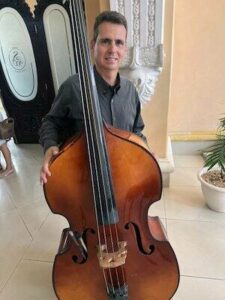
Tony Fernandez poses with his bass violin at a concert hall in Matanzas, Cuba. (Photo by Bobby Ross Jr.)
“Years ago, I tried just doing ministry and not being involved in music, and I almost fell into depression,” Fernandez said. “An artist or anyone who has received a gift from God has to use that their entire life. Otherwise, they are not going to function well.”
When he’s feeling overwhelmed, playing the bass violin revives him.
“I come up with the best solutions when I’m at a rehearsal or giving a concert,” he said.
As a bonus, his orchestra work helps him connect with leaders of the city of Matanzas, a Cuban cultural hub of music, art and architecture.
Fernandez’s love for symphonic music has not lessened his appreciation for a cappella singing in worship — the practice in most Churches of Christ, including his own.
“I’ve been able to use the best instrument that God gave me, and that is my voice,” he emphasized. “Nobody has complained about not having instruments, and we have a very lively, happy worship service on Sundays. Great musicians come and participate with us, and they feel right at home.”
One of the musicians converted by Fernandez is Bienvenido Quintana, the minister’s boyhood music teacher and now his chamber orchestra’s conductor.
A few years ago, Quintana’s daughter joined an exodus of Cubans to the U.S., and his wife followed her there to help care for their two young grandchildren. But he remains in Matanzas, responsible for his elderly mother.
Quintana praises Fernandez as one of the best bass violinists in Cuba and “the model of what a human should be.”
“It’s easy to get discouraged at a time like this,” Quintana said, speaking through an interpreter. “But I’ve found the church to be a refuge where I can find hope.
“Now the church is my family,” he added. “Tony is my family.”
Public expressions of faith
In 1993, while performing with an opera, Fernandez, then 20, traveled to Spain and met fellow members of Churches of Christ.
“A lot of the other musicians defected and stayed in Spain,” said Archer, who travels to Cuba three times a year. “But he understood that he had a commitment to the church and to working with his father and restoring the church.”
His friends warned him, “If you go back to Cuba, you’ll never be able to leave.”
But he didn’t want to leave.
He wanted to spread the Good News in his home country.
The collapse of the Soviet Union, Cuba’s main ally, had prompted Castro’s government to ease restrictions on public expressions of faith.
In 1992, Cuba amended its constitution to recognize religious freedom. However, the law doesn’t grant the right to build churches or other religious structures. Such construction requires government approval.
The U.S. still designates Cuba as a “country of particular concern” for severe violations of religious freedom.
“I think, depending on the religious organization, you’re seeing different levels of participation and acceptance and presence on the island,” said Michelle Gonzalez Maldonado, the daughter of Cuban exiles and a religion scholar who serves as provost of the University of Scranton, a Jesuit institution in Pennsylvania.
On one trip to Spain, Fernandez connected with Juan Antonio Monroy, an evangelist who in 1985 had become the first Church of Christ missionary to enter Cuba since Castro’s rise to power.
Monroy chose Fernandez to oversee Herald of Truth’s work in Cuba and follow up on contacts made via shortwave radio broadcasts from outside the island.
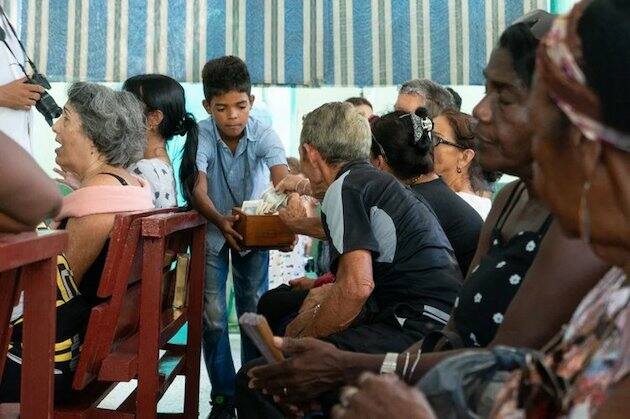
A boy helps collect the offering at the Versalles Church of Christ in Matanzas, Cuba. (Photo by Ilianis Cortés Rufín)
“I was very young, but Juan saw something in me,” said Fernandez, who has worked with Herald of Truth since 1995. “People would write to the church’s post office box. They would be asking for New Testaments and Bible study courses. But I’d always look for a way to go to their house and meet them.”
An artist in the family
Fernandez’s father died about 20 years ago. His mother, now 90 years old, remains a faithful Christian.
After the revolution, his dad worked as a sewing machine repairman.
He brought the Gospel with him into homes.
“When his father was alive, the church had a lot of seamstresses,” Archer said, pointing to his evangelistic zeal. “And with Tony, they’ve brought in a lot of musicians.”
And now, the church just might become a haven for artists.
Susana “Gio” Fernandez, the 18-year-old daughter of Tony and his wife, Liudmila, is an artist specializing in fine arts photography. She just opened her own studio in Matanzas.
Like her father and mother, who coordinates Texas International Bible Institute’s ministry in Cuba, Susana intends to use her talents for the Lord.
“I really believe that art is a way to share the Gospel,” she said. “I want young people to see that there are other ways to have fun besides just going out and dancing and drinking or whatever. I want to focus on art as a way to glorify God.”
As a young girl, Susana tried playing the piano and guitar, but she said she lacked her father’s musical prowess.
Still, she benefited from his example.
“I always saw him and how he is worried about helping his neighbor,” she said. “And that made me want to do the same.
“And I always said that the first work of art I sold, I wanted to use the money to help other people,” she added. “So that’s what has marked my decisions, my life as an artist.”
That outlook has marked her father’s ministry as well.
Given the hardships Cubans face, he finds his music especially helpful now.
“Jesus said that we have to weep with those that weep,” Fernandez said. “Here in Cuba, we have to be there to hug people and be with people, and the music prepares me for that.”
But Fernandez seeks salvation for his nation, not material riches.
“I’ll never forget what he told me one time,” Archer said. “He said, ‘I pray that abundance never comes to the island because people will stop seeking God.’ I thought that was very profound.”
–Bobb Ross Jr.. This piece is republished from ReligionUnplugged but originally from The Christian Chronicle.
Bobby Ross Jr. is a columnist for ReligionUnplugged.com and editor-in-chief of The Christian Chronicle. A former religion writer for The Associated Press and The Oklahoman, Ross has reported from all 50 states and 16 nations. He has covered religion since 1999.
 Metro Voice News Celebrating Faith, Family & Community
Metro Voice News Celebrating Faith, Family & Community

